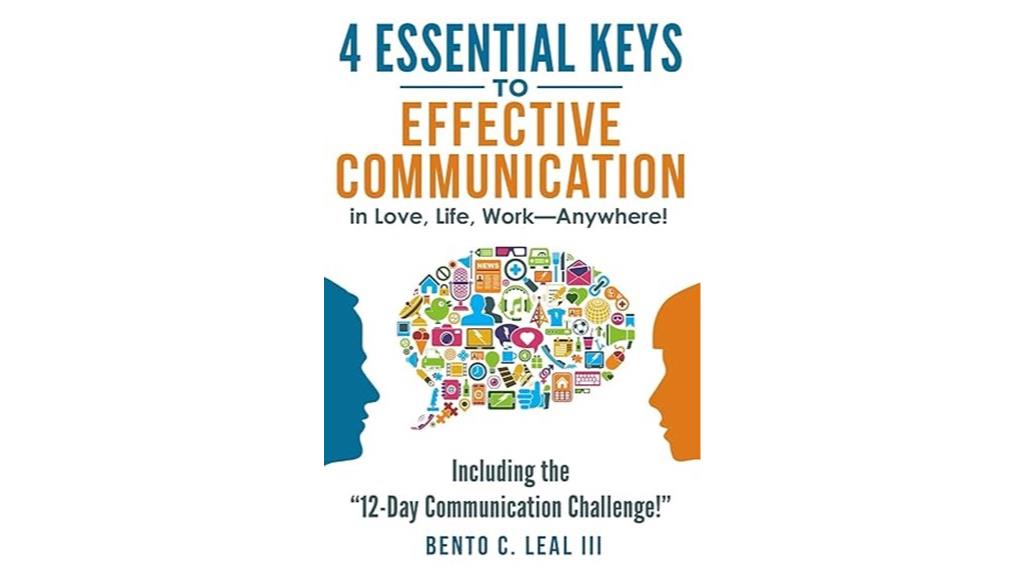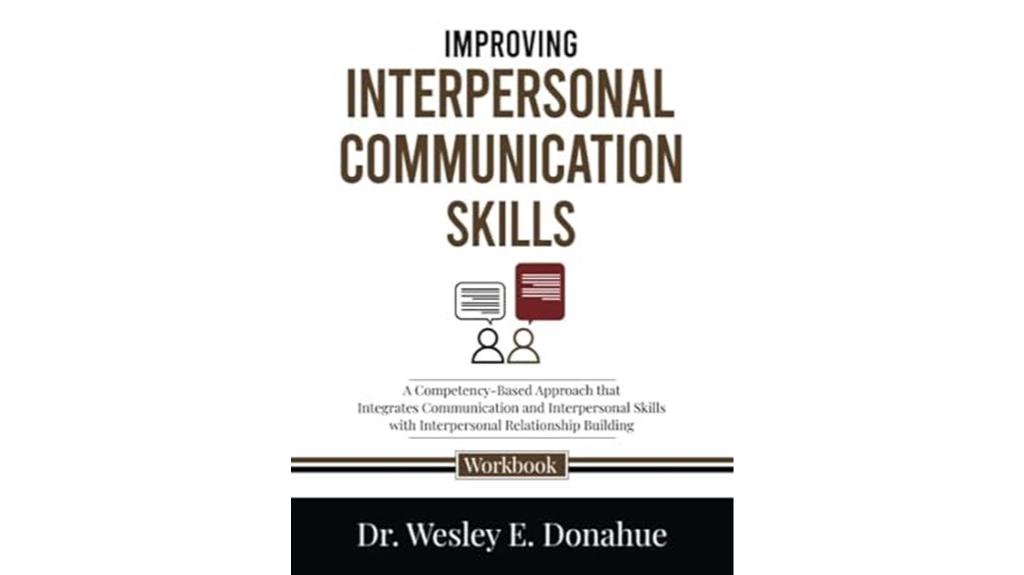If you want to boost your workplace confidence, I recommend starting with workbooks that focus on practical skills like active listening, clear messaging, and assertiveness. Look for those with real-life exercises, case studies, and easy-to-follow techniques. The best ones are credible, well-structured, and tailored to professional settings. Keep an eye out for resources that match your current skill level and goals—staying committed can truly transform your communication abilities, and there’s more to uncover as you explore further.
Key Takeaways
- Select workbooks that focus on workplace communication, active listening, assertiveness, and conflict resolution skills.
- Prioritize resources with practical exercises, role-playing, and real-life scenarios for effective skill transfer.
- Choose materials authored by experts with credible backgrounds in management, organizational development, or communication.
- Opt for well-structured, accessible formats like PDFs or interactive online platforms for flexible learning.
- Ensure the workbook content aligns with your specific workplace communication goals to boost confidence and effectiveness.
Effective Communication in Love, Life, Work

Are you looking to improve your communication skills across love, life, and work? I’ve found that mastering core principles like listening, empathy, and respectful responses truly transforms relationships and daily interactions. When I listen with curiosity and put judgment aside, I notice my connections deepen. Clearly expressing my feelings and practicing empathy every day helps me avoid misunderstandings. Many people think they communicate well, but real skill requires effort and education. Incorporating simple techniques, like active listening and honest expression, has made a noticeable difference. These tools are easy to learn and apply in any setting—romantic, personal, or professional.
Best For: individuals seeking to enhance their communication skills in love, personal relationships, and professional settings to foster deeper understanding and healthier interactions.
Pros:
- Easy-to-understand techniques that can be applied immediately in various contexts
- Improves listening, empathy, and clarity, leading to stronger relationships
- Suitable for busy people and can be integrated into daily life without time-consuming commitments
Cons:
- May require consistent practice to see significant long-term results
- Some users might find it too simplistic or basic if they already have advanced communication skills
- Not a substitute for professional therapy or counseling in severe relationship issues
Improving Interpersonal Communication Skills: Workbooks for Structured Learning

If you’re looking to strengthen your interpersonal communication skills through structured learning, these workbooks are an excellent choice for professionals, managers, and anyone enthusiastic to improve social interactions. They offer practical exercises, real-life examples, and strategies to dissect communication components, address common breakdowns, and build confidence. Wesley Donahue’s series focuses on active listening, clear messaging, and understanding communication processes, making complex concepts accessible and applicable. Whether for workplace relationships or personal interactions, these workbooks help develop skills that foster better understanding, reduce misunderstandings, and create a more positive environment. They’re perfect tools for targeted, effective skill enhancement.
Best For: professionals, managers, and individuals eager to enhance their interpersonal communication skills through practical, structured learning tools.
Pros:
- Provides practical exercises and real-life examples for effective learning.
- Focuses on core communication skills like active listening and clear messaging.
- Suitable for both workplace and personal relationship improvement.
Cons:
- Primarily designed for vocational settings, may require adaptation for personal use.
- May not cover advanced or specialized communication challenges extensively.
- Requires commitment to complete the exercises for optimal benefit.
Messages: The Communication Skills Book

Messages: The Communication Skills Book stands out as an excellent choice for anyone seeking practical, hands-on guidance to improve their everyday interactions. I’ve found it incredibly valuable over the years, especially its clear steps on listening, understanding body language, and assertiveness. Its interactive exercises, worksheets, and online resources make learning engaging and applicable. I often revisit chapters on negotiation and fair fighting, applying techniques in real situations. The book’s straightforward approach has helped me communicate more confidently with colleagues, friends, and family. Despite minor critiques, its practical content and timeless advice make it a must-have for anyone wanting to boost their workplace confidence.
Best For: individuals seeking practical, step-by-step guidance to enhance their communication skills in personal and professional settings.
Pros:
- Offers clear, actionable techniques for listening, body language, and assertiveness.
- Includes interactive exercises, worksheets, and online resources for engaging learning.
- Reputable and well-loved for its timeless, easy-to-understand advice suitable for various situations.
Cons:
- Some scenarios may not fit every reader’s context, requiring personal adaptation.
- Physical quality of the book can vary, and some users find certain content less applicable.
- Might benefit from a knowledgeable teacher for maximum understanding of some principles.
Factors to Consider When Choosing Communication Skills Workbooks

When choosing a communication skills workbook, I consider several key factors to guarantee it meets my needs. I look at the skill focus areas, practical exercises, and how easy it is to understand. It’s also important that the content suits my experience level and is written by an expert I can trust.
Skill Focus Areas
How do you choose a communication skills workbook that truly meets your needs? First, identify the specific areas you want to improve, like active listening, assertiveness, body language, or conflict resolution. Workbooks often focus on these targeted skills, so selecting one aligned with your goals increases your chances of progress. Also, consider the learning methods used—some offer exercises, worksheets, or real-life scenarios—so find a style that suits your preferences. Check if the techniques are practical and easy to apply in daily interactions, whether at work or in personal life. Finally, assure the workbook matches your current skill level, whether you’re a beginner or an advanced learner, to keep your development focused and effective.
Practical Exercises Included
Choosing a communication skills workbook with practical exercises can considerably boost your learning by actively engaging you in applying new techniques. Look for workbooks that include role-playing scenarios, self-assessment questionnaires, and interactive worksheets, as these help reinforce skills effectively. Real-life examples and case studies make it easier to transfer what you learn into everyday situations, boosting confidence. Structured activities like journaling prompts, reflection exercises, and practice dialogues develop listening, empathy, and assertiveness. The best workbooks offer step-by-step exercises that can be done alone or with others, supporting gradual mastery. Additionally, exercises targeting specific challenges like conflict resolution or body language interpretation make the workbook more relevant and practical, ensuring you get the most out of your practice.
Readability and Clarity
Have you ever struggled to understand a communication workbook because of confusing language or cluttered layout? If so, you’re not alone. Clear, straightforward language makes all the difference, helping you grasp concepts quickly, regardless of your skill level. Well-organized content with logical flow prevents confusion and keeps you engaged. Visual aids like charts, diagrams, and exercises enhance understanding and boost retention, making learning more interactive. Concise explanations paired with practical examples make complex skills feel accessible and relatable. Additionally, readability factors like larger fonts, clean layouts, and minimal jargon create a user-friendly experience. When choosing a workbook, prioritize those that promote clarity and ease of use—it’ll make your learning journey smoother and more effective.
Audience Suitability
When selecting a communication skills workbook, it’s important to take into account if the content suits the specific needs of your audience. Consider whether the workbook is tailored to the age group or demographic, like teens, adults, or professionals. Evaluate if the material matches their current communication challenges and skill levels, whether they’re beginners or advanced. Check if it provides practical exercises and examples relevant to their typical social or work interactions. The language and tone should resonate with their cultural background and education level, keeping it engaging and appropriate. Lastly, verify the content aligns with their goals—whether improving personal relationships, professional communication, or conflict resolution—so they find it relevant and useful.
Author Expertise Level
The expertise of an author considerably impacts the quality and usefulness of a communication skills workbook. An author with extensive experience in management, education, or communication tends to offer credible, practical insights that directly apply to real-world scenarios. When authors have backgrounds in psychology, counseling, or organizational development, they often incorporate evidence-based techniques proven to enhance communication. Recognized experts usually publish workbooks aligned with current research and best practices, ensuring you’re learning the most effective strategies. The author’s expertise level also influences the depth and complexity of exercises, providing more thorough explanations, real-world examples, and actionable steps. Choosing a workbook by a qualified author increases your chances of acquiring reliable, effective skills that translate seamlessly into the workplace.
Format and Accessibility
Choosing a communication skills workbook that’s accessible and well-structured can make a significant difference in your learning experience. I look for resources with clear, concise instructions and exercises that are easy to follow, accommodating different learning styles and literacy levels. It’s important that the format is versatile—ideally available as PDFs or through interactive online platforms—so I can learn flexibly across devices. Visual aids like diagrams or multimedia elements help me grasp concepts more effectively and retain information longer. I also prefer workbooks with adjustable difficulty or modular sections, allowing me to progress at my own pace and revisit topics as needed. A user-friendly layout with organized content, ample spacing, and clear headings reduces cognitive load, making my learning both efficient and enjoyable.
Application Versatility
Applying a communication skills workbook across different scenarios can substantially boost your ability to connect effectively in various settings. Versatile workbooks are designed for use in personal relationships, workplace interactions, and community involvement, making them highly adaptable. They often feature practical exercises that you can tailor to specific situations, whether you’re improving family communication or leading a team. This flexibility allows you to transfer skills like active listening to resolve conflicts or negotiate better outcomes. Many workbooks offer customizable content, helping you focus on your unique goals. By choosing a versatile workbook, you maximize its value, supporting ongoing growth across multiple areas of your social and professional life. This adaptability ensures continuous development and more confident communication in diverse contexts.
Frequently Asked Questions
How Long Does It Typically Take to See Improvement Using These Workbooks?
You can usually start seeing improvements within a few weeks of consistent practice. I recommend dedicating at least 15-20 minutes daily to work through the exercises. The key is regular effort and applying what you learn in real-life situations. With patience and persistence, you’ll notice your confidence growing and your communication becoming clearer, more effective, and more natural over time.
Are These Workbooks Suitable for All Skill Levels, From Beginner to Advanced?
Think of these workbooks as a sturdy ladder, suitable for climbers at every rung. I believe they’re perfect for all skill levels, from beginners to advanced communicators. Whether you’re just starting or refining your skills, each workbook offers meaningful insights and exercises tailored to your growth. You’ll find that with consistent effort, these tools empower you to elevate your confidence and clarity in any workplace situation, no matter your starting point.
Can These Workbooks Be Used for Self-Study Without a Coach or Instructor?
Yes, these workbooks are perfect for self-study without a coach or instructor. I’ve used them on my own, and they’re designed to be clear and easy to follow. They include practical exercises and tips that help you practice communication skills independently. Whether you’re a beginner or more advanced, you can work through them at your own pace, building confidence and improving your workplace interactions without needing additional guidance.
Do These Workbooks Include Practical Exercises or Real-Life Scenario Practice?
Yes, these workbooks are packed with practical exercises and real-life scenarios. I’ve found that actively engaging with these tasks helps me translate theory into action, making my communication more effective at work. They’re designed to challenge you and build confidence through hands-on practice. So, even without a coach, you can develop your skills by consistently applying the exercises and reflecting on your progress.
Are There Digital or Online Versions of These Communication Workbooks Available?
Yes, many of these communication workbooks are available in digital or online formats. I’ve found that e-books, interactive PDFs, and online courses make it easier to practice anytime, anywhere. These digital versions often include multimedia elements and interactive exercises, which help reinforce learning. I recommend exploring platforms like Amazon, Udemy, or your favorite e-book store to find the most convenient and accessible options for boosting your workplace confidence.
Conclusion
So, if you’re ready to turn the page and master your communication skills, these workbooks are your keys to confidence. Like a compass guiding a sailor through uncharted waters, they’ll steer you toward clearer, more effective interactions. Remember, every great speaker was once a beginner. Embrace the journey with patience and curiosity, and watch your workplace confidence grow—because the best conversations are just waiting to be started.










